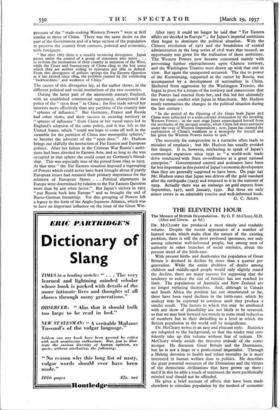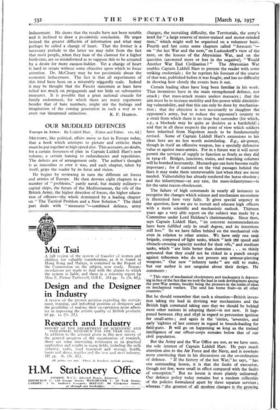THE ELEVENTH HOUR
DR. MCCLEARY has produced a most timely and readable volume. Despite the recent appearance of a number of learned works which make clear the nature of the existing problem, there is still the most profound ignorance, not only among otherwise well-informed people, but among men of authority in other branches of social statistics, about the present trend of the birth-rate.
With present birth- and death-rates the population of Great Britain is destined to decline by more than a quarter per generation. While the entire abolition of deaths among children and middle-aged people would only slightly retard the decline, there are many reasons for supposing that the tendency to reduce the size of families has not reached its limit. The populations of Australia and New Zealand are no longer replacing themselves. And, although in Canada and South Africa the position has not deteriorated so far, there have been rapid declines in the birth-rates which by analogy may be expected to continue until they produce a similar result. The factors to which this may be attributed with any show of plausibility are not likely to be reversed, so that we may look forward not merely to some small reductim of numbers but to their dwindling to a level at which the British population in the world will be insignificant.
Dr. McCleary writes in an easy and pleasant style. Statistics are relegated to the background, so that the reader may con- fidently take up this volume without fear of tedium. Dr. McCleary wisely avoids the tiresome attitude of the scare- monger. He discusses Great Britain and the Dominions, but he is not a jingo or a professional imperialist. Through a lifelong devotion to health and infant Mortality he is more interested in human welfare than in politics. He describes the great potential resources of the Dominions and the virtues of the demOcratic civilisations that have grown up there, and if in this he adds a touch of sentiment the most pacifistically minded soul should not be offended.
He gives a brief account of efforts that have been made elsewhere to stimulate population by the method of economic
inducement. He shows that the results have not been notable and is inclined to draw a pessimistic conclusion. He urges instead the greater diffusibh of information and what may perhaps be called a change of heart. That the former is a necessary prelude to the latter we may infer from the fact that most people, when they hear of the clamour for a higher birth-rate, are so misinformed as to suppose this to be actuated by a desire for mote cannon-fodder. Yet a change of heart is hard to secure without some objective upon which to focus attention. Dr. McCleary may be too pessimistic about the economic inducement. The fact is that all experiments of this kind have been on a miserably niggardly scale. Indeed it may be thought that the Fascist statesmen at least have relied too much. on propaganda and too little on substantive measures. It is possible that a great national crusade for family endowment, for which there are many arguments besides that of bare numbers, might stir the feelings and imagination of the coming generation in such a way as to





































































 Previous page
Previous page